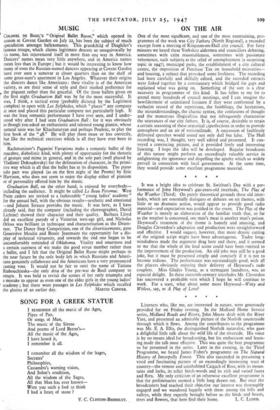ONE of the most significant, and one of the most
entertaining, pro- grammes of the week was City Fathers (North Regional), a recorded excerpt from a meeting of Kingston-on-Hull city council. For forty minutes we heard these Yorkshire aldermen and councillors debating, sometimes with calm reasonableness, sometimes with passionate vehemence, such subjects as the relief of unemployment (a surprising topic in 1947), municipal parks, the establishment of a city cultural centre, the imposition of Purchase Tax on household necessities— and housing, a subject that provoked some liveliness. The recording had been carefully and skilfully edited, and the recorded extracts were linked together by a commentary which bridged the gaps and explained what was going on. Something of the sort is a clear necessity in programmes of this kind. It has fallen to my lot to attend many hundreds of council meetings, and I can imagine the bewilderment of uninitiated listeners if they were confronted by a verbatim record of the repetitions, the fumblings, the hesitations, the misunderstandings, the chaotic syntax, the confusions of thought and the monstrous illogicalities that not infrequently characterise the utterances of our city fathers. It is, of course, desirable to retain a certain seasoning of these oratorical mperfections in order to provide atmosphere and an air of verisimilitude. A succession of faultlessly delivered speeches would sound not only dull but false. The Hull recording was, I thought, very well edited and presented. It con- veyed a convincing picture, and it provided lively and interesting listening. I hope the idea will be developed. Regular broadcasts of this nature might perform an exceedingly valuable service in enlightening the ignorance and dispelling the apathy which so widely prevail in connection with local government. At the same time, they would provide some excellent programme material.
* * * *
It was a bright idea to celebrate St. Swithun's Day with a per- formance of John Heywood's 400-years-old interlude, The Play of the Weather (Third). On purely theoretical grounds these old inter- ludes, which are essentially dialogues or debates on set themes, with little or no dramatic action, would appear to provide good radio material—and expectation was justified in the event. The Play of the Weather is merely an elaboration of the familiar truth that, so far as the weather is concerned, one man's meat is another man's poison. Heywood's treatment of the theme is homely and amusing, and Douglas Cleverdon's adaptation and production were straightforward and effective. I would suggest, however, that more drastic cutting of the original script might have been advantageous. Tudor long- windedness made the argument drag here and there, and it seemed to me that the whole of the final scene could have been omitted to the improvement of the production. An old joke may still be a good joke, but it must be presented crisply and concisely if it is not to become tedious. The performance was outstandingly good, with all the players obviously enjoying their delivery of Heywood's rude couplets. Miss Gladys Young, as a termagant laundress, was an especial delight. In these sixteenth-century interludes Mr. Cleverdon has uncovered a profitable vein which I hope he will continue to work. For a start, what about some more Heywood—Witty and Witless, say, or A Play of Love?
Listeners who, like me, are interested in nature, were generously provided for on Friday evening. In the Midland Home Service series, Midland Roads and Rivers, John Moore dealt with the River Yare, and presented an admirable picture of the Norfolk countryside through which it flows. Among the contributors to the programme was Mr. E. A. Ellis, the distinguished Norfolk naturalist, who gave a delightful little talk about the wild life of the riverside. His voice is by no means ideal for broadcasting, but his enthusiasm and learn- ing made the talk most effective. This was quite the best programme so far presented in the series. Later in the evening, in the Third Programme, we heard James Fisher's programme on The Natural History of Inverpolly Forest. This also succeeded in presenting a vivid and fascinating picture of an exceedingly interesting tract of country—the remote and uninhabited Caigach of Ross, with its moun- tains and lochs, its relict birch-woods and its rich and varied fauna and flora. My only criticism of an otherwise excellent programme is that the preliminaries seemed a little long drawn out. But once the broadcasters had reached their objective our interest was thoroughly engaged and we wandered happily with them among the hills and valleys, while they expertly brought before us the birds and beasts, trees and flowers, that here find their home. L. C. LLOYD.


































 Previous page
Previous page